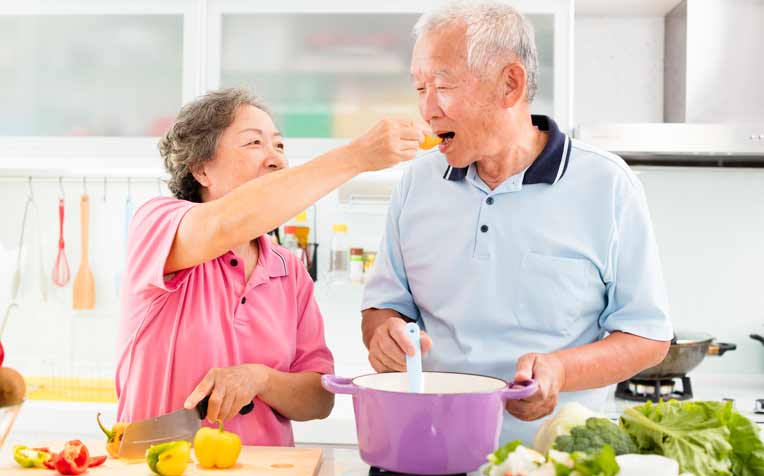
Nutrition plays an important role in helping elderly cancer patients cope with chemotherapy side effects.
Chemotheraphy, is it the best treatment?
Mr Lee Ah Seng*, 80, lives alone in a one-room HDB flat. He receives public assistance and collects tin cans to supplement his income. Nutrition isn't high on his list of priorities - he usually eats out, but occasionally misses a meal or two when he forgets to watch the time or runs out of money.
Mr Lee is a lifelong smoker. He has a chronic cough which in recent months has become blood-streaked and more persistent. In need of stronger cough medication, he saw a doctor at his local polyclinic who recognised signs of advanced lung cancer. This was confirmed with imaging and a biopsy.
Because of his age and lack of nutrition, doctors have to consider various things before working out a treatment plan for him. Will chemotherapy be benefical for him? Or will it do him more harm than good? Will he suffer from toxicity? Another important factor that doctors have to consider when treating the elderly is how the lack of proper nutrition could affect them after cancer treatment.
Nutrition in elderly is linked to chemotherapy effect
Dr Tira Tan, Consultant from the Division of Medical Oncology at National Cancer Centre Singapore (NCCS), a member of the SingHealth group, said that an elderly patient's nutrition status is associated with how well he or she copes with the cancer treatment. The malnourished tend to suffer more from the side effects of chemotherapy such as nausea, vomiting, diarrhoea, mouth ulcers and loss of energy.
Dr Tan said that although 60 per cent of cancer patients in Singapore are over 65 years old, there is very little clinical trial evidence available on their treatment. This is because elderly patients are not usually enrolled in trials due to their age and frailty. “We need more evidence and data to guide us on how to treat them,” she added.
In her study, Dr Tan analysed data collected by her mentor, Associate Professor Ravindran Kanesvaran, Deputy Head and Senior Consultant, Division of Medical Oncology at NCCS, who spearheaded the first (and so far, only) geriatric oncology clinical research programme in Singapore at NCCS. He interviewed 249 Asian cancer patients aged 70 to 94 years old between 2007 and 2010. They were suffering from a range of cancers, from gastrointestinal to lymphoma, and were interviewed before receiving cancer treatment at NCCS.
Dr Tan said the data showed that three quarters of them were at a moderate to high risk of lacking proper nutrition. Her study identified the following risk factors associated with the lack of proper nutrition:
When patients’ cancer is at an advanced stage: “Cancer cells produce hormones that can affect a patient’s oral intake and appetite. They lose weight and muscle mass.”
When they cope poorly with day-to-day activities: “The Eastern Cooperative Oncology Group (ECOG ) index is used to grade how independent a patient is in going about daily activities, such as getting out of bed, using the toilet and running errands. A patient who needs help is more likely to suffer from malnutrition.”
When patients suffer from anaemia: “Anaemia is common in those who suffer from chronic diseases. It can be secondary to the cancer itself, blood loss or the body’s impaired ability to make red blood cells. Anaemia causes symptoms such as lethargy, shortness of breath and heart problems. If severe, blood transfusions may be necessary, and treatment for cancer delayed.”
When patients suffer from depression: “When a patient’s mood is low, he often has a poor appetite and is also less willing to seek out food."
* The patient’s description is based on a typical patient profile from study.
Ref: K21
Contributed by
















 Get it on Google Play
Get it on Google Play